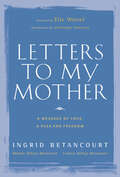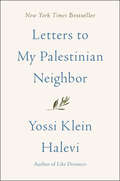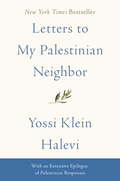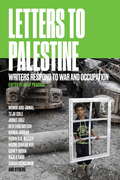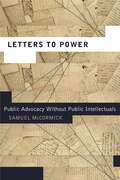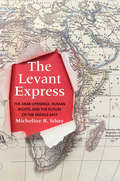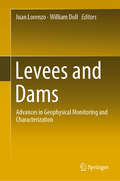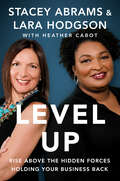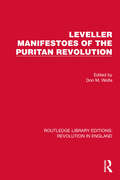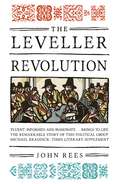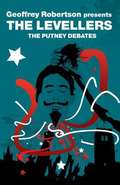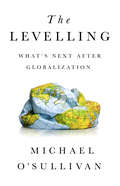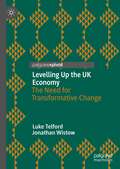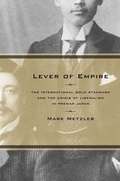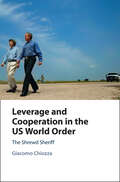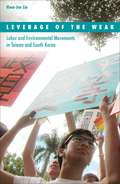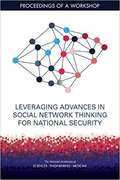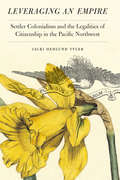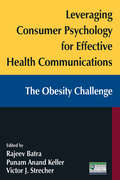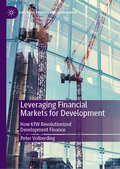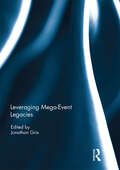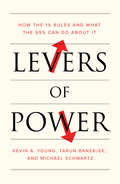- Table View
- List View
Letters To My Grandchildren: Lessons For The Future
by Tony BennAs a diarist I have chronicled the time through which I have lived in meticulous detail: but all that is history. What matters now is the future for those who will live through it.The past is the past but there may be lessons to be learned which could help the next generation to avoid mistakes their parents and grandparents made.Certainly at my age I have learned an enormous amount from the study of history - not so much from the political leaders of the time but from those who struggled for justice and explained the world in a way that shows the continuity of history and has inspired me to do my work.Normality for any individual is what the world is like on the day they are born. The normality of the young is wholly different from the normality of their grandparents.It is the disentangling of the real questions from the day to day business of politics that may make sense for those who take up the task as they will do.Every generation has to fight the same battles as their ancestors had to fight, again and again, for there is no final victory and no final defeat. Two flames have burned from the beginning of time - the flame of anger against injustice and the flame of hope. If this book serves its purpose it will fan both flames.
Letters to My Mother: A Message of Love, A Plea for Freedom
by Ingrid Betancourt Lorenzo Delloye-Betancourt Melanie Delloye-BetancourtOn December 1, 2007, during the arrest of several guerillas in Bogotá, the Colombian police confiscated a short video clip of political hostage Ingrid Betancourt. Accompanying the video was a twelve-page letter, dated October 24, 2007, written by Betancourt to her mother and family. Kidnapped on February 23, 2002, Betancourt has become an international symbol in the struggle for liberty and the fight against barbarity. Before being captured by the Revolutionary Armed Forces of Colombia (FARC), she was a voice of hope for the Colombian people, leading a courageous fight against political corruption, violence, and illegal detentions. Presented in this small, poignant book is Betancourt’s letter to her mother printed in English, French, and Spanish. From the depths of the Colombian jungle, Betancourt’s words are an impassioned declaration of love to those dearest to her. In addition to this letter is a response to Betancourt written by her children, who since they were teenagers have rallied public support for their mother’s release. With a preface by Nobel Peace Prize Laureate Elie Wiesel, Letters to My Mother conveys a powerful message of love for family and country, and a heartrending plea for freedom.
Letters to My Palestinian Neighbor
by Yossi Klein HaleviAttempting to break the agonizing impasse between Israelis and Palestinians, the Israeli commentator and award-winning author of Like Dreamers directly addresses his Palestinian neighbors in this taut and provocative book, empathizing with Palestinian suffering and longing for reconciliation as he explores how the conflict looks through Israeli eyes. <P><P>I call you "neighbor" because I don’t know your name, or anything personal about you. Given our circumstances, "neighbor" might be too casual a word to describe our relationship. We are intruders into each other’s dream, violators of each other’s sense of home. We are incarnations of each other’s worst historical nightmares. Neighbors? <P><P>Letters to My Palestinian Neighbor is one Israeli’s powerful attempt to reach beyond the wall that separates Israelis and Palestinians and into the hearts of "the enemy." In a series of letters, Yossi Klein Halevi explains what motivated him to leave his native New York in his twenties and move to Israel to participate in the drama of the renewal of a Jewish homeland, which he is committed to see succeed as a morally responsible, democratic state in the Middle East. <P><P>This is the first attempt by an Israeli author to directly address his Palestinian neighbors and describe how the conflict appears through Israeli eyes. Halevi untangles the ideological and emotional knot that has defined the conflict for nearly a century. In lyrical, evocative language, he unravels the complex strands of faith, pride, anger and anguish he feels as a Jew living in Israel, using history and personal experience as his guide. <P><P>Halevi’s letters speak not only to his Palestinian neighbor, but to all concerned global citizens, helping us understand the painful choices confronting Israelis and Palestinians that will ultimately help determine the fate of the region.
Letters to My Palestinian Neighbor
by Yossi Klein HaleviNew York Times bestseller "A profound and original book, the work of a gifted thinker."--Daphne Merkin, The Wall Street JournalAttempting to break the agonizing impasse between Israelis and Palestinians, the Israeli commentator and award-winning author of Like Dreamers directly addresses his Palestinian neighbors in this taut and provocative book, empathizing with Palestinian suffering and longing for reconciliation as he explores how the conflict looks through Israeli eyes.I call you "neighbor" because I don’t know your name, or anything personal about you. Given our circumstances, "neighbor" might be too casual a word to describe our relationship. We are intruders into each other’s dream, violators of each other’s sense of home. We are incarnations of each other’s worst historical nightmares. Neighbors?Letters to My Palestinian Neighbor is one Israeli’s powerful attempt to reach beyond the wall that separates Israelis and Palestinians and into the hearts of "the enemy." In a series of letters, Yossi Klein Halevi explains what motivated him to leave his native New York in his twenties and move to Israel to participate in the drama of the renewal of a Jewish homeland, which he is committed to see succeed as a morally responsible, democratic state in the Middle East.This is the first attempt by an Israeli author to directly address his Palestinian neighbors and describe how the conflict appears through Israeli eyes. Halevi untangles the ideological and emotional knot that has defined the conflict for nearly a century. In lyrical, evocative language, he unravels the complex strands of faith, pride, anger and anguish he feels as a Jew living in Israel, using history and personal experience as his guide.Halevi’s letters speak not only to his Palestinian neighbor, but to all concerned global citizens, helping us understand the painful choices confronting Israelis and Palestinians that will ultimately help determine the fate of the region.
Letters to Palestine
by Vijay PrashadOperation Protective Edge, Israel's seven-week bombing campaign and ground invasion of Gaza in the summer of 2014, resulted in half a million displaced Gazans, tens of thousands of destroyed homes, and more than 2,000 deaths--and, yet, it was only the latest in a long series of assaults endured by Palestinians isolated in Gaza. But, following the conflict, polls revealed a startling fact: for the first time, a majority of Americans under thirty found Israel's actions unjustified. Jon Stewart aired a blistering attack on Israeli violence, and a video of a UN spokesperson weeping as he was interviewed in Gaza went viral, appearing on Vanity Fair and Buzzfeed, among other sites. This book traces this swelling American recognition of Palestinian suffering, struggle, and hope, in writing that is personal, lyrical, anguished, and inspiring. Some of the leading writers of our time, such as Junot Díaz and Teju Cole, poets and essayists, novelists and scholars, Palestinian American activists like Huwaida Arraf, Noura Erakat, and Remi Kanazi, give voice to feelings of empathy and solidarity--as well as anger at US support for Israeli policy--in intimate letters, beautiful essays, and furious poems. This is a landmark work of controversial, committed literary writing.From the Trade Paperback edition.
Letters to Power: Public Advocacy Without Public Intellectuals (Rhetoric and Democratic Deliberation #2)
by Samuel McCormickAlthough the scarcity of public intellectuals among today’s academic professionals is certainly a cause for concern, it also serves as a challenge to explore alternative, more subtle forms of political intelligence. Letters to Power accepts this challenge, guiding readers through ancient, medieval, and modern traditions of learned advocacy in search of persuasive techniques, resistant practices, and ethical sensibilities for use in contemporary democratic public culture. At the center of this book are the political epistles of four renowned scholars: the Roman Stoic Seneca the Younger, the late-medieval feminist Christine de Pizan, the key Enlightenment thinker Immanuel Kant, and the Christian anti-philosopher Søren Kierkegaard. Anticipating much of today’s online advocacy, their letter-writing helps would-be intellectuals understand the economy of personal and public address at work in contemporary relations of power, suggesting that the art of lettered protest, like letter-writing itself, involves appealing to diverse, and often strictly virtual, audiences. In this sense, Letters to Power is not only a nuanced historical study but also a book in search of a usable past.
Lettres à un frère immigrant
by Franklin A. Díaz LárezTu as parfois imaginé quitter ton pays? Tu penses tout laisser derrière toi pour commencer un nouvelle vie ailleurs dans le monde? As-tu une idée, extrêment claire, de ce à quoi tu t'affrontes? Un texte écrit sous forme de lettres plaisantes adressées à un frère qui rêve d'émigrer Le frère va soulever ses doutes, ses inquiétudes et ses interrogations, et l'auteur y répond une a une dans un langage simple, clair et transparent, essayant ainsi que celui-ci prenne conscience des obstacles et des difficultés qui l'attendent, d'un côté, et de l'autre, des multiples opportunités qui se présenteront à lui, et qu'en raison des émotions ou de l'inconnu il n'est pas capable de prévoir.
The Levant Express: The Arab Uprisings, Human Rights, and the Future of the Middle East
by Micheline R. IshayA surprisingly hopeful assessment of the prospects for human rights in the Middle East, and a blueprint for advancing them The enormous sense of optimism unleashed by the Arab Spring in 2011 soon gave way to widespread suffering and despair. Of the many popular uprisings against autocratic regimes, Tunisia’s now stands alone as a beacon of hope for sustainable human rights progress. Libya is a failed state; Egypt returned to military dictatorship; the Gulf States suppressed popular protests and tightened control; and Syria and Yemen are ravaged by civil war. Challenging the widely shared pessimism among regional experts, Micheline Ishay charts bold and realistic pathways for human rights in a region beset by political repression, economic distress, sectarian conflict, a refugee crisis, and violence against women. With due attention to how patterns of revolution and counterrevolution play out in different societies and historical contexts, Ishay reveals the progressive potential of subterranean human rights forces and offers strategies for transforming current realities in the Middle East.
The Levanter
by Eric AmblerA Syrian businessman is drawn into the deadly machinations of Palestinian terrorists in the acclaimed author’s Gold Dagger–winning thriller.Syria, 1970. As a self-described “Levantine mongrel,” Michael Howell is used to navigating the shifting sands of Middle East politics. Over the years, he has successfully maintained his business enterprise through war, revolutions, and takeovers, thanks in part to his office manager—and mistress—Teresa.Staunchly apolitical and programmed for survival, Howell enjoys the sweet life. But that all changes one fateful night in Damascus, when he finds men working overtime in his factory—secretly making bombs for the fanatical Palestinian Action Force. Suddenly, Howell is caught in the middle with nowhere to run.
Levees and Dams: Advances in Geophysical Monitoring and Characterization
by Juan Lorenzo William DollThis book aims to inform policy-makers, engineers and earth scientists about the current and emerging role of geophysics in addressing environmental processes, assessments, and policy directions related to new and existing dams and levees. Until now geophysics has concentrated on characterization and remediation of dams and levees, but now the field is changing our understanding on the influence of natural processes (e.g., floods, dissolution) and human activities in the design, and management of these structures.This monograph includes advances in the following fields of Dams and Levees studies: · New insights from small and mid-sized laboratory experiments· Integrated methods electromagnetic, seismic, potential methods· Inverse modeling approaches· Statistical considerations· Monitoring of processes attending aging structures · Hazard monitoring· Risk Analysis
Level Up: Rise Above the Hidden Forces Holding Your Business Back
by Stacey Abrams Lara Hodgson Heather CabotAn inspiring and revelatory guide to starting and scaling a small business, from powerhouse duo Stacey Abrams and Lara Hodgson Like many business owners, renowned politician and activist Stacey Abrams didn&’t start a business because she dreamed of calling herself an entrepreneur. Her part-time post (and its $17,310 annual salary) as a member of the Georgia House of Representatives necessitated striking out on her own as a consultant—her first small business. Then, Stacey and her friend Lara Hodgson launched an infrastructure advisory firm—named Insomnia Consulting because they did their best thinking at 3:00 a.m.—and then another business, and then another. Fifteen years into their entrepreneurial journey together, they have tackled the obstacles that many business owners face: how to grow sustainably, hire thoughtfully, and keep up with the Goliaths in your industry. Now, for the first time, Stacey and Lara share their inspiring and relatable personal story and lessons learned the hard way to show how every business owner can confront the forces that conspire to keep small businesses small. Lauded for her &“resilient, visionary leadership&” (Barack Obama) and celebrated as a &“passionate advocate of democracy&” (Madeleine Albright), Stacey now brings her fierce sense of justice to the challenges that America&’s business owners face. Level Up arms readers with the confidence, know-how, and savvy to overcome the obstacles that hold their businesses back.
Leveller Manifestoes of the Puritan Revolution (Routledge Library Editions: Revolution in England #6)
by Don M. WolfeLeveller Manifestoes (1944) is a collection of primary manifestoes issued by the Levellers, the group which played an active and influential role in the English revolution of 1642–49. This book collects together rare pamphlets and tracts that are seldom available, and certainly not in one place for ease of research.
The Leveller Revolution: Radical Political Organisation in England, 1640-1650
by John ReesThe gripping story of the Levellers, the radical movement at the heart of the English RevolutionThe Levellers, formed out of the explosive tumult of the 1640s and the battlefields of the Civil War, are central figures in the history of democracy. In this thrilling narrative, John Rees brings to life the men--including John Lilburne, Richard Overton and Thomas Rainsborough--and women who ensured victory and became an inspiration to republicans of many nations.From the raucous streets of London and the clattering printers' workshops that stoked the uprising, to the rank and file of the New Model Army and the furious Putney debates where the Levellers argued with Oliver Cromwell for the future of English democracy, this story reasserts the revolutionary nature of the 1642-51 wars and the role of ordinary people in this pivotal moment in history.In particular Rees places the Levellers at the centre of the debates of 1647 when the nation was gripped by the question of what to do with the defeated Charles I. Without the Levellers and Agitators' fortitude and well-organised opposition history may have avoided the regicide and missed its revolutionary moment. The legacy of the Levellers can be seen in the modern struggles for freedom and democracy across the world.
The Levellers: The Putney Debates
by Philip Baker Geoffrey RobertsonEvolving from Oliver Cromwell's New Model army in Parliament's struggle against King Charles I, the Levellers pushed for the removal of corruption in parliament, universal voting rights and religious toleration. This came to a head with the famous debates between the Levellers and Cromwell at St Mary's church in Putney, London. Renowned human-rights lawyer and author Geoffrey Robertson argues for the relevance of the Levellers' stand today, showing how they were the first Western radical democrats.
The Levelling: What's Next After Globalization
by Michael O'SullivanA brilliant analysis of the transition in world economics, finance, and power as the era of globalization ends and gives way to new power centers and institutions. The world is at a turning point similar to the fall of communism. Then, many focused on the collapse itself, and failed to see that a bigger trend, globalization, was about to take hold. The benefits of globalization--through the freer flow of money, people, ideas, and trade--have been many. But rather than a world that is flat, what has emerged is one of jagged peaks and rough, deep valleys characterized by wealth inequality, indebtedness, political recession, and imbalances across the world's economies. These peaks and valleys are undergoing what Michael O'Sullivan calls "the levelling"--a major transition in world economics, finance, and power. What's next is a levelling-out of wealth between poor and rich countries, of power between nations and regions, of political accountability from elites to the people, and of institutional power away from central banks and defunct twentieth-century institutions such as the WTO and the IMF.O'Sullivan then moves to ways we can develop new, pragmatic solutions to such critical problems as political discontent, stunted economic growth, the productive functioning of finance, and political-economic structures that serve broader needs.The Levelling comes at a crucial time in the rise and fall of nations. It has special importance for the US as its place in the world undergoes radical change--the ebbing of influence, profound questions over its economic model, societal decay, and the turmoil of public life.
Levelling Up the UK Economy: The Need for Transformative Change
by Luke Telford Jonathan WistowThis book contributes to emerging debates about Levelling Up the UK Economy, considering these alongside the nature of, and trends in, both the political economy and spatial disparities. Drawing on a complex systems framing, the book pulls together a range of evidence to provide insights about the agenda from macro, meso and micro levels of analyses, including utilising qualitative data from a small scoping study with Directors of Regeneration across several ‘left behind’ places and 25 residents of ‘left behind’ Redcar & Cleveland in Teesside. The book outlines phases in capitalism’s development, particularly the shift from post-war capitalism to a post-industrial and neoliberal society and the implications for spatial inequalities. The 2022 Levelling Up White Paper is analysed alongside a focus on the role of local government relative to the agenda. The book offers an empirical case study of ‘left behind’ Redcar & Cleveland, exposing deindustrialisation, insecure employment, crime, anti-social behaviour and sentiments on a North South divide and Levelling Up. We suggest that only a transformative change in the political economy, including significant and sustained investment at different spatial levels, is likely to achieve the ambition to Level Up.
Lever of Empire: The International Gold Standard and the Crisis of Liberalism in Prewar Japan
by Mark MetzlerThis book is the first full account of prewar international money power in Japan, and a dramatically different reading of international monetary history from that given in hitherto European-centered accounts.
Leverage and Cooperation in the US World Order: The Shrewd Sheriff
by Giacomo ChiozzaSince the end of World War II, the United States has maintained a unique system of partnerships and alliances, known as the US world order. Within this order, it has sought both compliance from, and consensus with, its partners. Sometimes it has achieved both, sometimes one but not the other, and sometimes neither. What accounts for this variation in hegemonic leadership? Giacomo Chiozza suggests that the answer depends on the domestic political institutions that structure US relations with the incumbent leaders in the partner nations. Domestic political institutions that foster political successors and allow for regular and flexible channels of leadership turnover make it easier for the US to sustain friendly relations. However, unexpectedly, institutions that allow for regular and flexible channels of leadership turnover also create domestic political incentives that foster the attainment of better governance and more respect of human rights.
Leverage of the Weak
by Hwa-Jen LiuComparing Taiwan and South Korea strategically, Hwa-Jen Liu seeks an answer to a deceptively simple question: Why do social movements appear at different times in a nation's development?Despite their apparent resemblance--a colonial heritage, authoritarian rule, rapid industrialization, and structural similarities--Taiwan and South Korea were opposites in their experiences with two key social movements. South Korea followed a conventional capitalist route: labor movements challenged the system long before environmental movements did. In Taiwan, pro-environment struggles gained strength before labor activism. Liu argues that part of the explanation lies in an analysis of how movements advance their causes by utilizing different types of power. Whereas labor movements have the power of economic leverage, environmental movements depend on the power of ideology. Therefore, examining material factors versus ideational factors is crucial to understanding the successes (or failures) of social movements.Leverage of the Weak is a significant contribution to the literature on social movements, to the study of East Asian political economies, and to the progress of the comparative-historical method. It enhances knowledge of movement emergence, investigates the possibilities and obstacles involved in forging labor-environment alliances, and offers the first systematic, multilayered comparisons across movements and nations in East Asia.
Leveraging Advances in Social Network Thinking for National Security: Proceedings of a Workshop
by Engineering Medicine National Academies of SciencesBeginning in October 2017, the National Academies of Sciences, Engineering, and Medicine organized a set of workshops designed to gather information for the Decadal Survey of Social and Behavioral Sciences for Applications to National Security. The third workshop focused on advances in social network thinking, and this publication summarizes the presentations and discussions from this workshop.
Leveraging an Empire: Settler Colonialism and the Legalities of Citizenship in the Pacific Northwest
by Jacki Hedlund TylerThrough an evaluation of Oregon&’s exclusionary laws, Leveraging an Empire examines the process of settler colonialism in the evolving region of the Pacific Northwest between the years 1841 and 1859. Oregon laws—through nuanced emphases and new articulations—related to national issues of slavery, immigration, land ownership, education, suffrage, and naturalization.Leveraging an Empire demonstrates how the construction of laws governing matters of race, gender, and citizenship from Oregon&’s pre-territorial days through its early statehood reified and institutionalized American legal definitions and national perceptions of these issues leading up to the Civil War. Oregon&’s exclusionary laws either supported racial and gender restrictions to specific rights or established a legal precedent for such restrictions through the development of legislation governing the remainder of the century. These laws—some developed even before Oregon became part of the Union in 1846—also influenced federal treatment toward territorial and state policies that restricted American citizens from political rights and reveal the impact of settler colonialism in the American West on the nation.
Leveraging Consumer Psychology for Effective Health Communications: The Obesity Challenge
by Rajeev Batra Victor J. Strecher Punam Anand KellerThis timely book brings together some of the most higly respected scholars and practitioners in the consumer psychology and health communication fields to analyze how the latest research can be effectively applied to the critical public health issue of obesity.
Leveraging Financial Markets for Development: How KfW Revolutionized Development Finance (Executive Politics and Governance)
by Peter VolberdingThis book investigates how development institutions created and promoted marketized development financial instruments to increase the speed and scope of assistance by leveraging private financial markets for development objectives. To attract private investors, donor governments agreed to bear the risk in these new instruments in order to mobilize investment during times of political crisis. In particular, this book contends that Germany’s KfW played an outsized role in the development of these new financial instruments, particularly in microfinance banks and structured funds, as KfW’s unique institutional attributes and strong political support from the German government at critical junctures fostered financial innovation. Using over 70 interviews and a cache of newly released archival materials, this books documents how KfW and other development institutions created and promoted these marketized development financial instruments, and how they have become a pillar of modern development policy.
Leveraging Mega-Event Legacies
by Jonathan GrixThis is a multi-disciplinary contribution to the burgeoning literature on and around mega-events in general and sports mega-events in particular. The volume is not specifically about mega-events or their management, but rather how such events act as a lens through which a number of important and critical questions about the decisions to host, the host nation, its society and the politics of culture, sport and leisure more broadly can be dealt with. In doing so this book seeks to build on, and out from initial work on (sports) mega events by acknowledging the major shift towards ‘emerging’ states awarded such events since 2006 and incorporating the latest advances in research that have taken place in recent years. For example, debates about what constitutes a ‘mega-event’, what is meant by a ‘legacy’, what is ‘soft power’ and so on are dealt with from a team of leading academics from a variety of academic disciplines. This book was previously published as a special issue of Leisure Studies.
Levers of Power: How the 1% Rules and What the 99% Can Do About It
by Michael Schwartz Kevin A. Young Tarun BanerjeeUnderstanding the power of the corporations and how to take the struggle directly to themIt's no secret that "the 1%" - the business elite that commands the largest corporations and the connected network of public and private institutions- exercise enormous control over U.S. government. While this control is usually attributed to campaign donations and lobbying, Levers of Power argues that corporate power derives from control over the economic resources on which daily life depends. Government officials must constantly strive to keep capitalists happy, lest they go on "capital strike" - that is, refuse to invest in particular industries or locations, or move their holdings to other countries - and therefore impose material hardship on specific groups or the economy as a whole. For this reason, even politicians who are not dependent on corporations for their electoral success must fend off the interruption of corporate investment.Levers of Power documents the pervasive power of corporations and other institutions with decision-making control over large pools of capital, particularly the Pentagon. It also shows that the most successful reform movements in recent U.S. history - for workers' rights, for civil rights, and against imperialist wars - succeeded by directly targeting the corporations and other institutional adversaries that initiated and benefitted from oppressive policies. Though most of today's social movements focus on elections and politicians, movements of the "99%" are most effective when they inflict direct costs on corporations and their allied institutions. This strategy is also more conducive to building a revolutionary mass movement that can replace current institutions with democratic alternatives.

